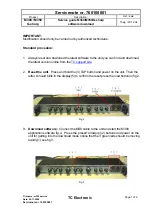
Overview
Document Number: 646710
17
GPIO Configuration
Each GPIO pin can be configured as an input, an input with open-drain capability, or an output.
The GPIOs are connected to the Tsi109 Host Bridge GPIO pins. The GPIO Interface has a set
of output latches, which depending on configuration, either drive the output enables or the
output pins. The Interface also has a set of input buffers that provides the state of the GPIO
pins and can be read at any time.
The GPIO pins can also be used as additional interrupt inputs by mapping the pins to one or
more of the four interrupt output pins. Each pin can be configured to generate an interrupt on
an edge-detected transition (low-to-high or a high-to-low), or a level-detected state. Table 1
below list the location and destination of the GPIOs.
Table 1
GPIOs Signals and Destinations
Signal
Destination
GPIO0
J4, Pin 35
GPIO1
J4, Pin 36
GPIO2
J4, Pin 37
GPIO3
J4, Pin 38
GPIO4
J4, Pin 39
GPIO5
J4, Pin 40
GPIO6
J4, Pin 41
GPIO7
J4, Pin 42
GPIO8
R6: Pull up to SW2 Pin 8
GPIO9
R7: To on-board CPLD (not used by default)
GPIO10
SEL/F/B: Select front or rear connection for
the Gigabit Ethernet port). This pin by default
has a pull down. Driving the pin high and
routes the Gigabit to the front. Default = Front
(the open boot drives this pin high)
GPIO11
*MR: Master Reset, pulling this pin low will
reset the board
GPIO12
LED0 (Front Panel) see note
GPIO13
LED1 (Front Panel) see note
GPIO14
LED2 (Front Panel) see note
GPIO15
LED3 (Front Panel) see note
NOTE:
*All LED's (LED0 to LED3) are active low.
Summary of Contents for Xembedded XPMC-6710
Page 2: ...This page is intentionally left blank...
Page 4: ...This page is intentionally left blank...
Page 8: ...XPMC 6710 Reference Manual 8 Document Number 646710 This page is intentionally left blank...
Page 10: ...XPMC 6710 Reference Manual 10 Document Number 646710 This page is intentionally left blank...















































